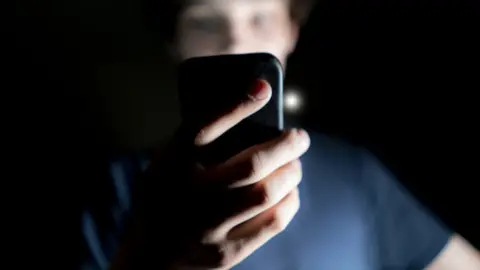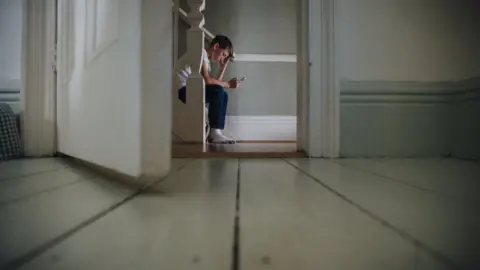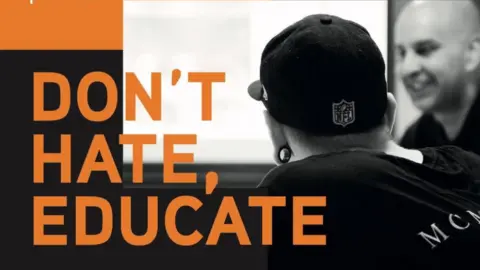Coronavirus: 'Children may have been radicalised in lockdown'
 Getty Images
Getty ImagesChildren have been exposed to more extremist material on social media during lockdown and could return to school radicalised, it has been warned.
Wales' top counter-terrorism police officer said the risk of radicalisation had increased as children and young people have spent more time online.
This is despite a decline in anti-terror referrals since lockdown, according to Det Supt Jim Hall.
The Welsh Government said it remained committed to preventing radicalisation.
"Despite that reduction in referrals, we know that the threat is not going away," said Det Supt Hall, head of the Welsh Extremism and Counter Terrorism Unit (Wectu).
"In fact, it is likely that the risk of radicalisation has increased for a small number of vulnerable people, as the pandemic may have driven young people to spend more time online and exacerbate grievances, which makes people more vulnerable to radicalisation."
He said the drop in referrals to Prevent, the UK government's anti-terrorism strategy, was likely due to the closure of schools and reductions in social care and mental health provision.
 Getty Images
Getty ImagesDet Supt Hall added that extremist recruiters had adapted "their narratives and methods" to create "discord and distrust within communities" during the coronavirus pandemic.
He called on people to be vigilant to changes in behaviour or suspicious online activity.
The BBC has seen posts on far-right online chat groups linking anti-racism group Black Lives Matter to terrorist organisations.
Other posts claim Muslims are disproportionately affected by Covid-19 because they had not observed lockdown guidelines, and many perpetuate conspiracy theories about Chinese involvement in the intentional spread of the virus.
There has been a particular rise in far-right posts in recent months, racism educator Nicky Nijjer has said.
Mr Nijjer, originally from London, works for the Don't Hate, Educate project, based in Swansea, and part of his work involves monitoring extremist content online.
He said teachers "need to be alert" to and challenge extremist attitudes among pupils when schools reopen in Wales on Monday.
 EYST
EYST"They have had nothing but pollution," he said.
"These teachers need to be alert. They need to be on guard and if it gets too serious then they need to call in intervention."
Developed by the Ethnic Minorities and Youth Support (Eyst) charity, Don't Hate, Educate aims to challenge misconceptions and myths about race and religion by introducing children and young people to others from different backgrounds.
In February, Home Office figures showed more than 250 people in Wales had been flagged up to police and councils over concerns about extremism.
About half of those referred under Prevent were aged 20 or younger, with about a quarter of concerns related to right-wing extremism and 15% Islamist extremism.
At the time, schools inspectorate Estyn warned some schools could miss chances to address extremism because they do not think it is relevant.
An Estyn spokeswoman acknowledged there was an increased risk of radicalisation due to lockdown, and called on teachers to "record and report all incidents of racist language and racial bullying".
Mr Nijjer said areas of Wales where few immigrants live were more susceptible to far-right ideology, and that the problem of racism in Wales had become worse in recent years.
"The right-wing rhetoric is getting out of control," he added.
The Welsh Government said it had provided resources on Hwb, its online learning platform, aimed at helping parents and carers protect children online during lockdown.
A spokeswoman added: "We have funded the Welsh Extremism and Counter Terrorism Unit and partners to develop resources to prevent radicalisation and we will continue to work with our partners to support schools in building learners' resilience when confronted with radicalised and extremist influences."
